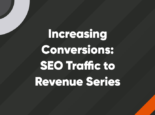
8 Digital Marketing Tips to Help Your Business Survive a Recession

Fear of a recession or an ongoing economic downturn leaves many marketers struggling to prove the value of marketing to stakeholders while driving revenue for their businesses when consumers are keeping a tighter hold on their budgets.
When battling a recession or tough economic conditions, many businesses cut their marketing budget first. But with revenue on the line, marketing is essential for fueling business. Investing in digital marketing is investing in the long-term growth of your business.
Marketing during a recession or period of slow economic growth isn't easy, but with our top tips on building a recession-proof business, you can ensure your company comes out on top. Here are our tips for marketing in a recession, including where to spend, what to focus on, and how to switch up your messaging.
1. Don’t cut your marketing budget
We know the knee-jerk reaction is to drastically cut costs when faced with financial and economic troubles. It seems counterintuitive to keep marketing when revenue and demand are down. But cutting your budget could be catastrophic to your business, especially if you lack the brand recognition and market share that could keep you going in place of a marketing budget.
Think of this scenario: A recession hits and you keep advertising while your competition cuts their budget, pauses, or decreases spending. Your business keeps your marketing budget mostly intact. Who is going to have an easier time acquiring new customers both during and after the recession: You, the company that kept marketing, or your competition who halted everything?
When companies feel the reverberating effects of a recession, there will be less competition, leaving an opportunity for you to fill in the gaps.
Instead of cutting your marketing budget, take this time to review and reallocate. You may consider investing more in your digital marketing rather than traditional marketing, or reevaluating the tools you’re currently using and cutting out the ones that no longer make sense for your business. Dig into your marketing budget and find ways to minimize spend without losing out on marketing performance.
2. Invest in SEO and digital advertising
Two of the safest digital marketing channels you can invest in during a recession are SEO and digital ads. SEO and PPC will work together to help your business thrive during a financial downturn, and SEO will position your business strongly post-recession. Both of these tactics have strong ROI, so even though it might feel risky to pour money and resources into these areas, the payoff is well worth it.
Making sure your SEO and PPC campaigns are aligned is always critical, but even more so in times of uncertainty. During a recession, user behavior shifts because needs and priorities change. While you always want to rank at the top of search results for your core service offerings, you also need to consider which keywords people are searching for now. PPC campaigns can put you on top immediately before others start bidding on those keywords, and a proactive SEO strategy can help you dominate the rankings early.
You may be tempted to shut off SEO or PPC during a recession if the search volume is trending downward for your target queries, but this mistake will result in losing big on those new search terms that start trending. By pairing SEO and PPC together and paying close attention to your PPC budget, you can consistently show up when your target audience needs you.
One added benefit of keeping your digital advertising budget at full strength during a recession is that your dollars can go further. With many companies pulling back on spending, advertising costs often drop with the decreased competition. That could mean more leads and more revenue without having to increase your spending, which is great news for growth-minded businesses.
If you're not sure how to approach these channels, consider partnering with an agency that specializes in SEO services and PPC campaigns that can help you determine priorities and make the necessary optimizations to meet your goals.
3. Optimize your website
Your website is your 24/7 working employee. It is always active and doesn't log off when you log off for the day. It's often the place where users will first interact with your brand, so it needs to be fully optimized. If it's not delivering valuable information to your customers, easy to navigate, and engaging, you’ll miss out on potential leads and revenue.
An outdated website can hurt even more during a recession when consumer uncertainty and doubt are at an all-time high. Your customers need to know they can trust you, and one of the best ways to build trust is with a modern website that speaks to customers’ needs and responds to their journey.
Before optimizing your website, perform an audit and analyze what's working and what isn’t. Is your content written for people and search engines? Is your site easy to navigate? If you are not sure which parts of your website need work, have a web design company help you rebuild your site or consult on helpful changes.
4. Stay active on social media
During a crisis like a recession, people tend to save money, stay home, and spend more time online. You need to be where your customers are, which is often going to be on social media. With smart social campaigns and creative content, your brand will be able to effectively connect with your audience digitally. Social media marketing during a recession assures your audience that they can count on you to stay consistent in an inconsistent environment.
While using social, experiment with video content. 86% of video marketers noticed an increase in lead generation in 2022. Videos can offer more engagement with your customers and can also provide a deeper understanding of what you offer. Static single images don’t provide the engagement and creative understanding that a video can.
You could also pair organic social with paid to see greater results. Paid social media can boost your conversions and lead numbers – just make sure you are using the right channels for your audience and finding ways to offer helpful, quality content that your audience cares about.
5. Be transparent when communicating with customers
If we learned anything from marketing during COVID, it’s that brand transparency goes a long way. People are more willing to forgive if businesses can own their mistakes. Take the post-pandemic supply chain issues, for instance. Rather than leaving customers hanging when their online order was delayed, successful businesses proactively communicated issues and provided support along the way.
Now is not the time to let up on customer service; instead, use your marketing channels to connect with your audience and provide enhanced support to demonstrate to your audience that even in this difficult time, your brand is there.
6. Continue measuring and reporting
Using your analytics platform to measure success will help you make data-driven decisions on what’s working and what you may need to adjust in your marketing strategy. While it’s always important to measure your results and put more money into what’s working, this is even more true during a recession when budgets are tight.
Just make sure you aren’t too quick to cut something that isn’t driving immediate results. Lots of your marketing efforts may produce indirect results, so don’t confuse direct attribution with results (or lack thereof).
Google Analytics 4 is a great solution for businesses to use to measure website performance and see the tangible results behind marketing dollars. This platform will take some getting used to – it's much different from Universal Analytics, its predecessor. If you could use help setting up a Google Analytics 4 account for your business or just need a quick audit to make sure the events you care about are getting tracked properly, reach out!
7. Bring empathy into everything you do
A recession is a time of uncertainty and difficulty for everyone, including your audience. The marketing tactics that worked in the past might not work during this time, and that’s ok. You’ll need to find new ways to approach your audience that are less focused on your needs and more on theirs.
What, exactly, does that mean?
It means that you’ll need to put your struggles aside and focus on the things that are impacting them. Their pain points might look different right now, and they might not be able to purchase from you. Alter your messaging to convey that you’ll be there for them when they need you and provide helpful guidance related to your products or services. Receiving hard-sell emails during a recession can feel tone-deaf and reflect poorly on the business, so make sure you’re approaching your audience as humans first.
That doesn’t mean there isn’t room for selling, however. It just means you should be mindful and understand who your audience is before reaching out.
8. Practice upselling
Your current customers are some of your biggest advocates and are also the prospects most primed to make a purchase. You don’t have to sell them on the value of your products or services and can jump right into sharing your latest product release or telling them about other solutions you offer that might fit their business.
Be strategic about how you target your audience, the cadence of your outreach, and the messaging you use to speak to your current customers – the last thing you want to do is overwhelm or bother them.
Can recessions yield results?
Turbulent times often create stress and anxiety for business owners and companies. But it doesn’t always have to be like that. Many businesses that are prepared and strengthen themselves early on experience great outcomes and significant growth.
Let’s take a look at some success stories:
1. Warby Parker
Warby Parker, the glasses company, can be touted as the great recession baby. This company was founded in the great recession of 2008 by leveraging wonderful digital marketing tactics.
They noticed a gap in the industry and delivered the perfect solution. They figured out it was hard for people to get fashionable, affordable glasses online. The products were affordable which is key during a recession. This is a great example of addressing pain points and showing up to solve them.
2. Netflix
Netflix is a media giant with a lot of resources at its dispense, but they weren’t like this in 2008. In the time of the great recession in 2008, that’s when Netflix released its streaming service. Throughout 2009, they acquired partnerships with companies like Xbox to continue to grow and develop. In 2008 they were increasing memberships while others were decreasing.
This is a great example of how they used innovative and creative branding to gather new customers.
3. Allegiance Flag Supply
This South Carolina startup, featured in a post-pandemic New York Times article, was founded in 2019. With the business model of selling hand-sewn American flags made in the U.S., the company launched digital ad campaigns but saw very few sales prior to the start of the pandemic. Their ad targeting hadn't been working, and they hadn't been effectively demonstrating the product's quality and American-made values. But in March 2020, Allegiance Flag Supply dialed in their digital ads and saw their e-commerce site take off with the increase of online shopping. They used their marketing tools to reach their target audience and blew sales out of the water.
Finding marketing success in a recession
You don’t have to be a big company to withstand a recession, and you don’t have to create a new product either. As long as you are investing in what works and focusing on providing great value to your target customers, you will set yourself up for success.
If you are considering a budget decrease, it’s important to understand the potential impacts. Talk to a top-performing agency or consultant who has experience predicting drops in results when you pull back on your spending.
We understand this is a turbulent time and that you may have no clue where to start. Leave all that up to Perrill. We are a full-service, in-house digital agency that will help you navigate all your digital needs to make sure you are fully prepared amidst a recession or any other challenge. Reach out to start the conversation.

Nate Tower
Nate Tower is the President of Perrill and has over 12 years of marketing and sales experience. During his career in digital marketing, Nate has demonstrated exceptional skills in strategic planning, creative ideation and execution. Nate's academic background includes a B.A. with a double major in English Language and Literature, Secondary Education, and a minor in Creative Writing from Washington University. He further expanded his expertise by completing the MBA Essentials program at Carlson Executive Education, University of Minnesota.
Nate holds multiple certifications from HubSpot and Google including Sales Hub Enterprise Implementation, Google Analytics for Power Users and Google Analytics 4. His unique blend of creative and analytical skills positions him as a leader in both the marketing and creative worlds. This, coupled with his passion for learning and educating, lends him the ability to make the complex accessible and the perplexing clear.
Join Our Newsletter


Why Google Shouldn’t Reveal Its Search Algorithm


8 Signs You Need a Website Redesign


